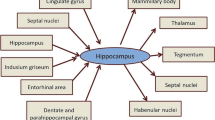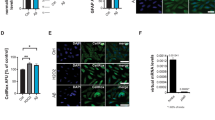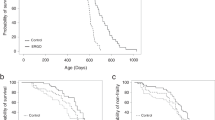Abstract
Probiotics are referred to species of living microscopic organisms may help conserve the normal balance of the digestive system and/or manage diseases. A number of autoimmune, psychiatric, cardiovascular and cerebrovascular disorders may be associated with the imbalance of gut microbiota. This study examines the effect of 21 days consumption of multistrain probiotics on hippocampus injury, spatial and learning memory and some potential molecular mechanisms in a mouse model with cerebral hypoperfusion. Cerebral hypoperfusion was established in the mouse model by bilateral common carotid artery occlusion (BCCAO) for 20 min and 24 h reperfusion. Mixtures of several probiotic bacteria at concentrations of 107, 108 and 109 CFU/day were orally administrated for 3 weeks before the BCCAO. Spatial and learning memory, histological damage and apoptosis were assessed in the CA1, CA3 and dentate gyrus (DG) of the hippocampus 24 h after ischemia. The malondialdehyde (MDA) content and brain-derived neurotrophic factor (BDNF) level were measured by ELISA technique. Prophylactic of probiotic considerably reduced the number of apoptotic cells and neuronal death in the CA1, CA3 and DG of the hippocampus at all three concentrations (P < 0.001). In addition, probiotics reduced spatial memory impairment and neurological dysfunction only at the 109-CFU/day (P < 0.01). Nonetheless, probiotics did not change the levels of BDNF and MDA in the hippocampus (P > 0.05). According to the findings, the daily prophylactic ingestion of probiotics reduced hippocampus damage and prevented the spatial learning and memory deficit by suppressing apoptosis in the mouse model with cerebral hypoperfusion. Probiotic supplementation may be suggested as a useful preventive dietary strategy for groups susceptible to cerebrovascular diseases.






Similar content being viewed by others
References
Singh VP, Sharma J, Babu S, Rizwanulla SA, Singla A (2013) Role of probiotics in health and disease: a review. J Pak Med Assoc 63(2):253–257
Tsai Y-L, Lin T-L, Chang C-J, Wu T-R, Lai W-F, Lu C-C, Lai H-C (2019) Probiotics, prebiotics and amelioration of diseases. J Biomed Sci 26(1):3. https://doi.org/10.1186/s12929-018-0493-6
Peters V, van de Steeg E, van Bilsen J, Meijerink M (2019) Mechanisms and immunomodulatory properties of pre-and probiotics. Benef Microbes 19(3):225–236
Kerry RG, Patra JK, Gouda S, Park Y, Shin H-S, Das G (2018) Benefaction of probiotics for human health: a review. J Food Drug Anal 26(3):927–939
Raabis S, Li W, Cersosimo L (2019) Effects and immune responses of probiotic treatment in ruminants. Vet Immunol Immunopathol 208:58–66
Timmerman H, Koning C, Mulder L, Rombouts F, Beynen A (2004) Monostrain, multistrain and multispecies probiotics—a comparison of functionality and efficacy. Int J Food Microbiol 96(3):219–233
Kane L, Kinzel J (2018) The effects of probiotics on mood and emotion. J Am Acad PAs 31(5):1–3
Mayer EA, Knight R, Mazmanian SK, Cryan JF, Tillisch K (2014) Gut microbes and the brain: paradigm shift in neuroscience. J Neurosci 34(46):15490–15496
Nadeem I, Rahman MZ, Ad-Dab’bagh Y, Akhtar M (2018) Effect of probiotic interventions on depressive symptoms: a narrative review evaluating systematic reviews. Psychiatry Clin Neurosci 73(4):154–162
Tillisch K (2014) The effects of gut microbiota on CNS function in humans. Gut Microbes 5(3):404–410
Wang Z, Klipfell E, Bennett BJ, Koeth R, Levison BS, DuGar B, Feldstein AE, Britt EB, Fu X, Chung Y-M (2011) Gut flora metabolism of phosphatidylcholine promotes cardiovascular disease. Nature 472(7341):57
Akhoundzadeh K, Vakili A, Shadnoush M, Sadeghzadeh J (2018) Effects of the oral ingestion of probiotics on brain damage in a transient model of focal cerebral ischemia in mice. Iran J Med Sci 43(1):32–40
Bercik P, Denou E, Collins J, Jackson W, Lu J, Jury J, Deng Y, Blennerhassett P, Macri J, McCoy KD (2011) The intestinal microbiota affect central levels of brain-derived neurotropic factor and behavior in mice. Gastroenterology 141(2):599–609.e593
Neufeld K-AM, Kang N, Bienenstock J, Foster JA (2011) Effects of intestinal microbiota on anxiety-like behavior. Commun Integr Biol 4(4):492–494
Savignac HM, Corona G, Mills H, Chen L, Spencer JP, Tzortzis G, Burnet PW (2013) Prebiotic feeding elevates central brain derived neurotrophic factor, N-methyl-D-aspartate receptor subunits and D-serine. Neurochem Int 63(8):756–764
Corpuz H, Ichikawa S, Arimura M, Mihara T, Kumagai T, Mitani T, Nakamura S, Katayama S (2018) Long-term diet supplementation with Lactobacillus paracasei K71 prevents age-related cognitive decline in senescence-accelerated mouse prone 8. Nutrients 10(6):762
Liu J, Sun J, Wang F, Yu X, Ling Z, Li H, Zhang H, Jin J, Chen W, Pang M (2015) Neuroprotective effects of Clostridium butyricum against vascular dementia in mice via metabolic butyrate. Biomed Res Int 2015:412946. https://doi.org/10.1155/2015/412946
Nowacka M, Obuchowicz E (2013) BDNF and VEGF in the pathogenesis of stress-induced affective diseases: an insight from experimental studies. Pharmacol Rep 65(3):535–546
Harris NM, Ritzel R, Mancini NS, Jiang Y, Yi X, Manickam DS, Banks WA, Kabanov AV, McCullough LD, Verma R (2016) Nano-particle delivery of brain derived neurotrophic factor after focal cerebral ischemia reduces tissue injury and enhances behavioral recovery. Pharmacol Biochem Behav 150:48–56
Tan M, Zhu J-C, Du J, Zhang L-M, Yin H-H (2011) Effects of probiotics on serum levels of Th1/Th2 cytokine and clinical outcomes in severe traumatic brain-injured patients: a prospective randomized pilot study. Crit Care 15(6):R290. https://doi.org/10.1186/cc10579
Sadeghzadeh J, Vakili A, Sameni HR, Shadnoush M, Bandegi A-R, Khorasani MZ (2017) The effect of oral consumption of probiotics in prevention of heart injury in a rat myocardial infarction model: a histopathological, hemodynamic and biochemical evaluation. Iran Biomed J 21(3):174–181
Zille M, Farr TD, Przesdzing I, Muller J, Sommer C, Dirnagl U, Wunder A (2012) Visualizing cell death in experimental focal cerebral ischemia: promises, problems, and perspectives. J Cereb Blood Flow Metab 32(2):213–231. https://doi.org/10.1038/jcbfm.2011.150
Behrouzifar S, Vakili A, Bandegi AR, Kokhaei P (2018) Neuroprotective nature of adipokine resistin in the early stages of focal cerebral ischemia in a stroke mouse model. Neurochem Int 114:99–107
Mihara M, Uchiyama M (1978) Determination of malonaldehyde precursor in tissues by thiobarbituric acid test. Anal Biochem 86(1):271–278
Fang H-R, Zhang G-Q, Cheng J-Y, Li Z-Y (2018) Efficacy of Lactobacillus-supplemented triple therapy for Helicobacter pylori infection in children: a meta-analysis of randomized controlled trials. Eur J Pediatr 178(1):7–16
Wang Z-H, Gao Q-Y, Fang J-Y (2013) Meta-analysis of the efficacy and safety of Lactobacillus-containing and Bifidobacterium-containing probiotic compound preparation in Helicobacter pylori eradication therapy. J Clin Gastroenterol 47(1):25–32
O’Hagan C, Li JV, Marchesi JR, Plummer S, Garaiova I, Good MA (2017) Long-term multi-species Lactobacillus and Bifidobacterium dietary supplement enhances memory and changes regional brain metabolites in middle-aged rats. Neurobiol Learn Mem 144:36–47
Romo-Araiza A, Gutiérrez-Salmeán G, Galván EJ, Hernández-Frausto M, Herrera-López G, Romo-Parra H, García-Contreras V, Fernández-Presas AM, Jasso-Chávez R, Borlongan CV (2018) Probiotics and prebiotics as a therapeutic strategy to improve memory in a model of middle-aged rats. Front Aging Neurosci 18(10):416. https://doi.org/10.3389/fnagi.2018.00416
Chunchai T, Thunapong W, Yasom S, Wanchai K, Eaimworawuthikul S, Metzler G, Lungkaphin A, Pongchaidecha A, Sirilun S, Chaiyasut C (2018) Decreased microglial activation through gut-brain axis by prebiotics, probiotics, or synbiotics effectively restored cognitive function in obese-insulin resistant rats. J Neuroinflamm 15(1):11. https://doi.org/10.1186/s12974-018-1055-2
Savignac H, Tramullas M, Kiely B, Dinan T, Cryan J (2015) Bifidobacteria modulate cognitive processes in an anxious mouse strain. Behav Brain Res 287:59–72
Musa NH, Mani V, Lim SM, Vidyadaran S, Majeed ABA, Ramasamy K (2017) Lactobacilli-fermented cow’s milk attenuated lipopolysaccharide-induced neuroinflammation and memory impairment in vitro and in vivo. J Dairy Res 84(4):488–495
Davari S, Talaei S, Alaei H (2013) Probiotics treatment improves diabetes-induced impairment of synaptic activity and cognitive function: behavioral and electrophysiological proofs for microbiome–gut–brain axis. Neuroscience 240:287–296
Sarkar A, Harty S, Lehto SM, Moeller AH, Dinan TG, Dunbar RI, Cryan JF, Burnet PW (2018) The microbiome in psychology and cognitive neuroscience. Trends Cognit Sci 22(7):611–636
Mohajeri MH, Brummer RJ, Rastall RA, Weersma RK, Harmsen HJ, Faas M, Eggersdorfer M (2018) The role of the microbiome for human health: from basic science to clinical applications. Eur J Nutr 57(1):1–14
Sun J, Ling Z, Wang F, Chen W, Li H, Jin J, Zhang H, Pang M, Yu J, Liu J (2016) Clostridium butyricum pretreatment attenuates cerebral ischemia/reperfusion injury in mice via anti-oxidation and anti-apoptosis. Neurosci Lett 613:30–35
Lamprecht M, Bogner S, Schippinger G, Steinbauer K, Fankhauser F, Hallstroem S, Schuetz B, Greilberger JF (2012) Probiotic supplementation affects markers of intestinal barrier, oxidation, and inflammation in trained men; a randomized, double-blinded, placebo-controlled trial. J Int Soc Sports Nutr 9(1):45. https://doi.org/10.1186/1550-2783-9-45
Vaghef-Mehrabany E, Homayouni-Rad A, Alipour B, Sharif S-K, Vaghef-Mehrabany L, Alipour-Ajiry S (2016) Effects of probiotic supplementation on oxidative stress indices in women with rheumatoid arthritis: a randomized double-blind clinical trial. J Am Coll Nutr 35(4):291–299
Wang T, Hu X, Liang S, Li W, Wu X, Wang L, Jin F (2015) Lactobacillus fermentum NS9 restores the antibiotic induced physiological and psychological abnormalities in rats. Benef Microbes 6(5):707–717
Bercik P, Park A, Sinclair D, Khoshdel A, Lu J, Huang X, Deng Y, Blennerhassett P, Fahnestock M, Moine D (2011) The anxiolytic effect of Bifidobacterium longum NCC3001 involves vagal pathways for gut–brain communication. Neurogastroenterol Motil 23(12):1132–1139
Jeong J-J, Kim K-A, Ahn Y-T, Sim J, Woo J, Huh C, Kim D-H (2015) Probiotic mixture KF attenuates age-dependent memory deficit and lipidemia in Fischer 344 rats. J Microbiol Biotechnol 25(9):1532–1536
Liu Y-W, Liu W-H, Wu C-C, Juan Y-C, Wu Y-C, Tsai H-P, Wang S, Tsai Y-C (2016) Psychotropic effects of Lactobacillus plantarum PS128 in early life-stressed and naïve adult mice. Brain Res 1631:1–12
Acknowledgements
This work was financially supported by Vice Chancellor for Research of Semnan University of Medical Sciences (Grant Number: 1306).We are grateful to the ZIST TAKHMIR Company for providing the LactoCare capsule. We thanks from Prof. Ali Rashidy-pour and Prof. Parviz Kokhaei for valuable comments and correction of manuscript. This article is extracted from the MS.c student thesis of Rahmati Hamideh.
Author information
Authors and Affiliations
Corresponding author
Ethics declarations
Conflict of interest
Authors have declared no conflicts of interest.
Additional information
Publisher's Note
Springer Nature remains neutral with regard to jurisdictional claims in published maps and institutional affiliations.
Rights and permissions
About this article
Cite this article
Rahmati, H., Momenabadi, S., Vafaei, A.A. et al. Probiotic supplementation attenuates hippocampus injury and spatial learning and memory impairments in a cerebral hypoperfusion mouse model. Mol Biol Rep 46, 4985–4995 (2019). https://doi.org/10.1007/s11033-019-04949-7
Received:
Accepted:
Published:
Issue Date:
DOI: https://doi.org/10.1007/s11033-019-04949-7




